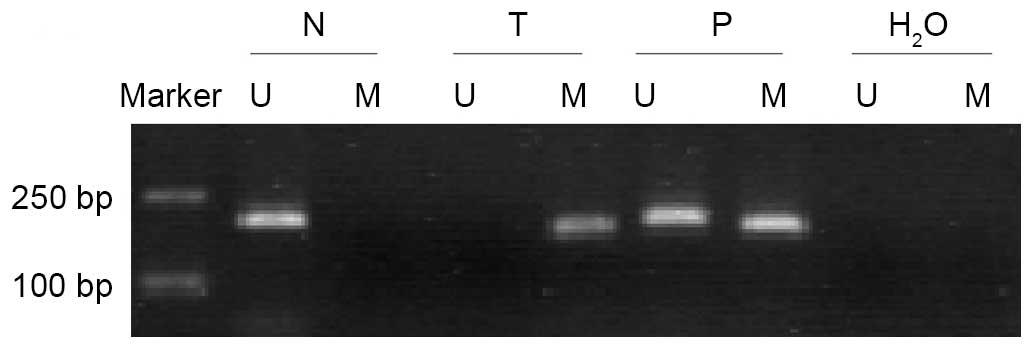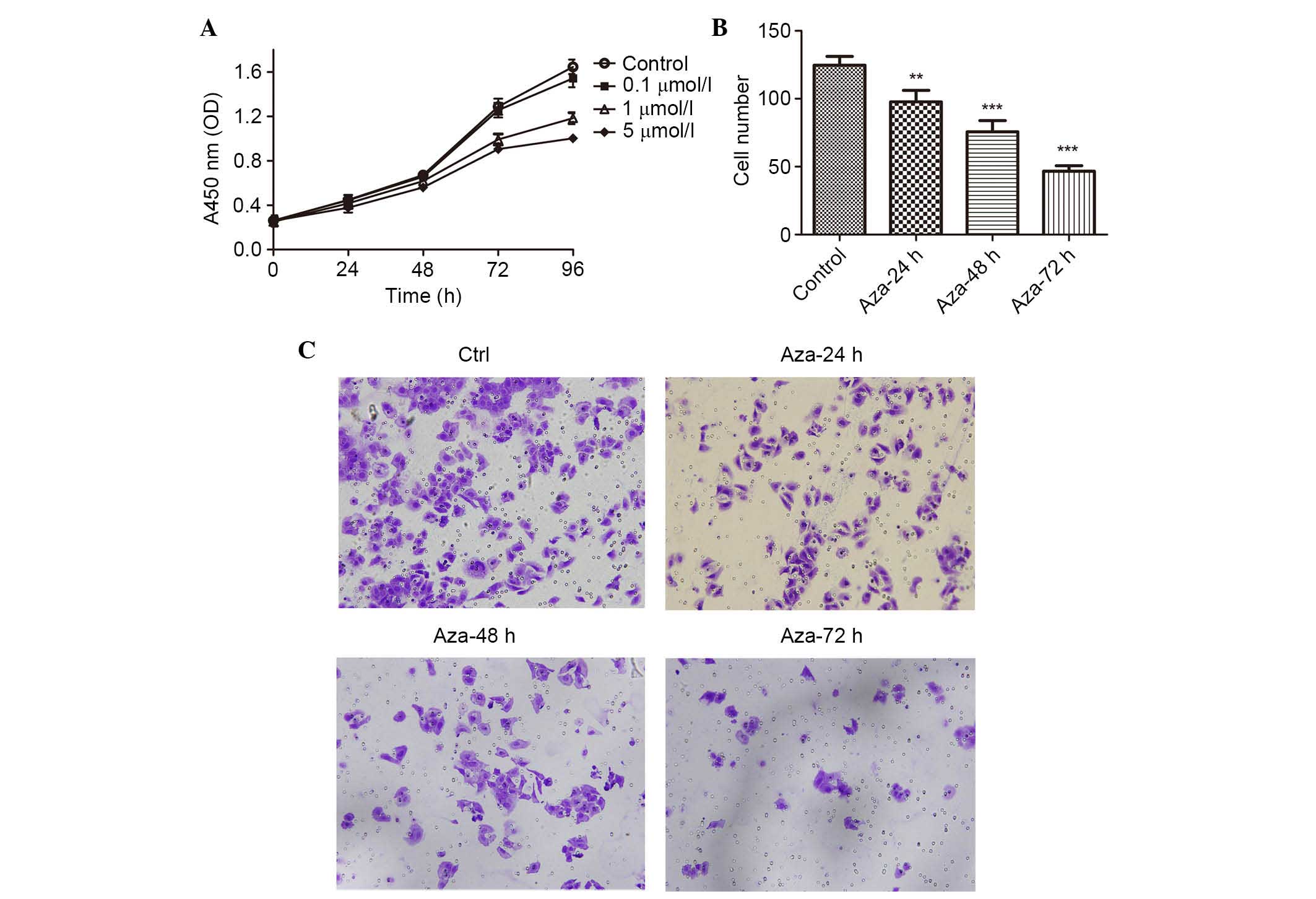|
1
|
Choong N and Vokes E: Expanding role of
the medical oncologist in the management of head and neck cancer.
CA Cancer J Clin. 58:32–53. 2008. View Article : Google Scholar
|
|
2
|
Belcher R, Hayes K, Fedewa S and Chen AY:
Current treatment of head and neck squamous cell cancer. J Surg
Oncol. 110:551–574. 2014. View Article : Google Scholar : PubMed/NCBI
|
|
3
|
Shivapurkar N and Gazdar AF: DNA
methylation based biomarkers in non-invasive cancer screening. Curr
Mol Med. 10:123–132. 2010. View Article : Google Scholar : PubMed/NCBI
|
|
4
|
Heyn H and Esteller M: DNA methylation
profiling in the clinic: Applications and challenges. Nat Rev
Genet. 13:679–692. 2012. View
Article : Google Scholar : PubMed/NCBI
|
|
5
|
Silverstein RL and Febbraio M:
CD36-TSP-HRGP interactions in the regulation of angiogenesis. Curr
Pharm Des. 13:3559–3567. 2007. View Article : Google Scholar
|
|
6
|
Kazerounian S, Yee KO and Lawler J:
Thrombospondins in cancer. Cell Mol Life Sci. 65:700–712. 2008.
View Article : Google Scholar : PubMed/NCBI
|
|
7
|
Yee KO, Connolly CM, Duquette M,
Kazerounian S, Washington R and Lawler J: The effect of
thrombospondin-1 on breast cancer metastasis. Breast Cancer Res
Treat. 114:85–96. 2009. View Article : Google Scholar :
|
|
8
|
Lin XD, Chen SQ, Qi YL, Zhu JW, Tang Y and
Lin JY: Overexpression of thrombospondin-1 in stromal
myofibroblasts is associated with tumor growth and nodal metastasis
in gastric carcinoma. J Surg Oncol. 106:94–100. 2012. View Article : Google Scholar : PubMed/NCBI
|
|
9
|
Kasper HU, Ebert M, Malfertheiner P,
Roessner A, Kirkpatrick CJ and Wolf HK: Expression of
thrombospondin-1 in pancreatic carcinoma: Correlation with
microvessel density. Virchows Arch. 438:116–120. 2001. View Article : Google Scholar : PubMed/NCBI
|
|
10
|
Rojas A, Meherem S, Kim YH, Washington MK,
Willis JE, Markowitz SD and Grady WM: The aberrant methylation of
TSP1 suppresses TGF-beta1 activation in colorectal cancer. Int J
Cancer. 123:14–21. 2008. View Article : Google Scholar : PubMed/NCBI
|
|
11
|
Lindner DJ, Wu Y, Haney R, Jacobs BS,
Fruehauf JP, Tuthill R and Borden EC: Thrombospondin-1 expression
in melanoma is blocked by methylation and targeted reversal by
5-Aza-deoxycytidine suppresses angiogenesis. Matrix Biol.
32:123–132. 2013. View Article : Google Scholar :
|
|
12
|
Guo W, Dong Z, He M, Guo Y, Guo J, Chen Z,
Yang Z and Kuang G: Aberrant methylation of thrombospondin-1 and
its association with reduced expression in gastric cardia
adenocarcinoma. J Biomed and Biotechnol. 2010:7214852010.
View Article : Google Scholar
|
|
13
|
Livak KJ and Schmittgen TD: Analysis of
relative gene expression data using real-time quantitative PCR and
the 2(-Delta Delta C(T)) method. Methods. 25:402–408. 2001.
View Article : Google Scholar
|
|
14
|
Chen H, Herndon ME and Lawler J: The cell
biology of thrombos-pondin-1. Matrix Biol. 19:597–614. 2000.
View Article : Google Scholar : PubMed/NCBI
|
|
15
|
Baenziger NL, Brodie GN and Majerus PW: A
thrombin-sensitive protein of human platelet membranes. Proc Natl
Acad Sci USA. 68:240–243. 1971. View Article : Google Scholar : PubMed/NCBI
|
|
16
|
Fleitas T, Martínez-Sales V, Vila V,
Reganon E, Mesado D, Martín M, Gómez-Codina J, Montalar J and
Reynés G: VEGF and TSP1 levels correlate with prognosis in advanced
non-small cell lung cancer. Clin Transl Oncol. 15:897–902. 2013.
View Article : Google Scholar : PubMed/NCBI
|
|
17
|
Streit M, Velasco P, Brown LF, Skobe M,
Richard L, Riccardi L, Lawler J and Detmar M: Overexpression of
thrombospondin-1 decrease angiogenesis and inhibits the growth of
human cutaneous squamous cell carcinomas. Am J Pathol. 155:441–452.
1999. View Article : Google Scholar : PubMed/NCBI
|
|
18
|
Zhang C, Li H, Wang Y, Liu W, Zhang Q,
Zhang T, Zhang X, Han B and Zhou G: Epigenetic inactivation of the
tumor suppressor gene RIZI in hepatocellular carcinoma involves
both DNA methylation and histone modifications. J Hepatol.
53:889–895. 2010. View Article : Google Scholar : PubMed/NCBI
|
|
19
|
Cherrier T1, Suzanne S, Redel L, Calao M,
Marban C, Samah B, Mukerjee R, Schwartz C, Gras G, Sawaya BE, et
al: p21 (WAF1) gene promoter is epigenetically slienced by CTIP2
and SUV39H1. Oncogene. 28:3380–3389. 2009. View Article : Google Scholar : PubMed/NCBI
|
|
20
|
Oue N, Matsumura S, Nakayama H, Kitadai Y,
Taniyama K, Matsusaki K and Yasui W: Reduced expression of the TSP1
gene and its association with promoter hypermethylation in gastric
carcinoma. Oncology. 64:423–429. 2003. View Article : Google Scholar : PubMed/NCBI
|
|
21
|
Guerrero D, Guarch R, Ojer A, Casas JM,
Ropero S, Mancha A, Pesce C, Lloveras B, Garcia-Bragado F and Puras
A: Hypermethylation of the thrombospondin-1 gene is associated with
poor prognosis in penile squamous cell carcinoma. BJU Int.
102:747–755. 2008. View Article : Google Scholar : PubMed/NCBI
|
|
22
|
Gong J, Zhu SG, Wu CY, Li XG, Liu YG, Ren
XH and Zhang Y: Aberrant methylation of NF2, TIMP-3 and THBS1 genes
and their diagnostic values in meningiomas. Zhonghua Yi Xue Za Zhi.
92:2889–2892. 2012.In Chinese.
|
|
23
|
Yang QW, Liu S, Tian Y, Salwen HR,
Chlenski A, Weinstein J and Cohn SL: Methylation-associated
silencing of the thrombospondin-1 gene in human neuroblastoma.
Cancer Res. 63:6299–6310. 2003.PubMed/NCBI
|
|
24
|
Meng CF, Zhu XJ, Peng G and Dai DQ: Role
of histone modifications and DNA methylation in the regulation of
O6-methylguanine-DNA methyltransferase gene expression in human
stomach cancer cells. Cancer Invest. 28:331–339. 2010. View Article : Google Scholar
|
|
25
|
Hu Q, Yu L, Chen R, Wang YL, Ji L, Zhang
Y, Xie Y and Liao QP: 5-aza-2′-deoxycytidine improves the
sensitivity of endometrial cancer cells to progesterone therapy.
Int J Gynecol Cancer. 22:951–959. 2012. View Article : Google Scholar : PubMed/NCBI
|


















